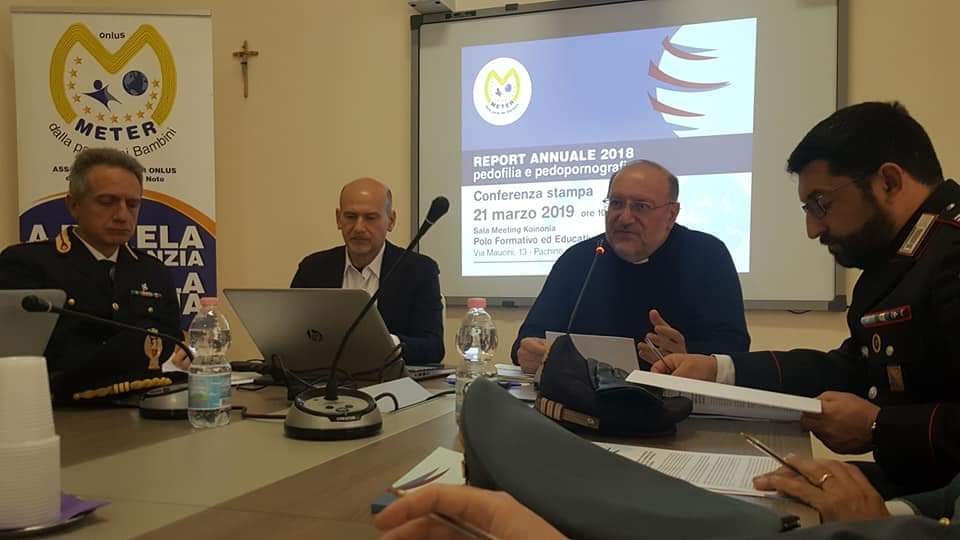ROME – A yearly report published by an Italian watchdog organization against pedophilia and child pornography offers a glimpse of this widespread and complex phenomenon. But according to the priest who founded it, the global reality of pedophilia is still met by “complicit silence.”
“Our report highlighted the very few countermeasures that exist and a diffused indifference,” said Italian Father Fortunato Di Noto, founder of the anti-abuse network Meter Onlus that issued the report, in an interview with Crux.
For the past 30 years, Di Noto and his non-profit organization have been working tirelessly to identify and report pedo-pornographic material hidden in all the corners of the internet. Its 2018 report, released March 21, shows that while the number of monitored links has decreased, there was an increase of content containing sexual violence against children.
In 2018, Meter found and reported to the appropriate authorities over 3 million photos and more than 1 million videos.
While these numbers may be shocking, they only refer to those identified and reported by the non-profit, which is only a small part of the picture. “These numbers don’t reflect the reality,” Di Noto said, which instead is much, much bigger.
At the end of the February abuse summit, which brought together the heads of bishops’ conferences from around the world to discuss the protection of minors within the Catholic Church, Pope Francis said that more than 18 million children are victims of sexual abuse in Europe alone.
According to World Health Organization data from 2014, more than 120 million children are sexually abused worldwide, and official government data showed that in the United States 700,000 children are victims of either physical violence or abuse every year.
Di Noto lives under Italian state protection after he uncovered thousands of prostitution rings involving children both in Italy and abroad and received numerous death threats, demonstrating that being on the side of the world’s most exploited children can also mean putting one’s own life at risk.
Meter’s purpose is also that of “creating a collective conscience” for the protection of minors, Di Noto said, which can only be done through partnerships and collaborations with countries and institutions. Meter provides training for abuse prevention at schools, conferences and dioceses and plans to bring its findings and know-how to the United Nations.
“We are always available to the Church, and also other religious confessions, to bring our experience,” the priest said.
Working together is paramount to fighting the sexual abuse of minors, since many countries and nationalities are involved in the trafficking of child pornography. The Meter report showed that the island of Tonga in Oceania has the highest number of fist level domains containing images and videos of the sexual abuse of minors, followed by Guernsey in the English Channel and the British Indian Ocean Territory.
These islands are simply the geographic location of the servers providing the internet domain, but the actual perpetrators can be found elsewhere – like placing foreign plates on one’s car to avoid being fined or arrested. But Di Noto believes that internet providers should still take an active role in preventing the distribution of child pornography.
“We point our finger to the tech magnates, because they cannot tolerate that this tragedy exists in the spaces of the web,” he said.
Meter traced the links containing child sexual abuse to Europe (6,388), America (5,926), Asia (155), Africa (120) and Oceania (31). The group reported more than 166,000 sites in the past 15 years, picking up a lot of data concerning the traits and techniques of predators on the internet.
Children between the ages of eight and 12 are the ones preferred by online pedophiles, followed by children between the ages of three and seven. Hundreds of media files depicting the sexual abuse of infants from zero to two years of age were also found by Meter.
From file sharing services to the Deep Web, online predators searching and providing child pornography have adapted to new technologies, making them harder to identify and trace. Di Noto also spoke of the existence of lobbies that promote child pornography, from offering tips on how to “groom” children to chat rooms where they share their experiences.
Di Noto feels like he has “an evangelical mission” to eradicate this phenomenon but cannot do it alone. Local authorities and international organizations must join forces if this evil is to truly be eradicated, the priest said.
“There is no preventive and education action, which is a silver bullet for a process of child protection. There is no uniform law,” Di Noto said in a statement.
“Europe and many countries in the world should responsibly and seriously deal with the protection of children, but this does not happen. Silence and indifference kill even more the weak lives of children victims of such pervert and cruel action. An abuse remains an abuse, and it leaves permanent marks.”











